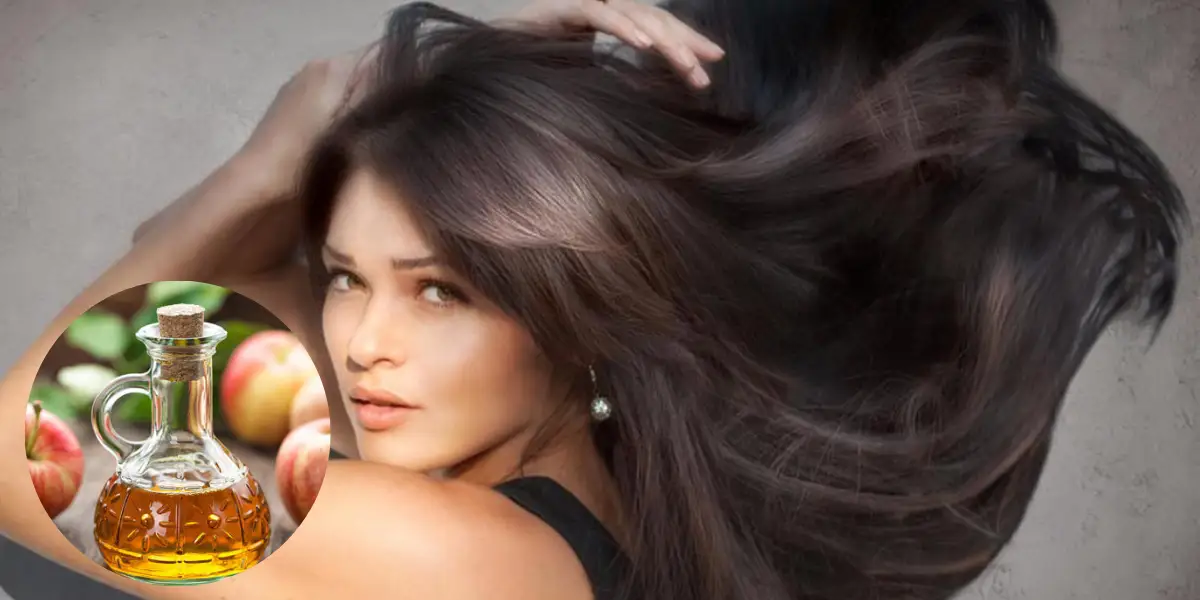What do you think of a hair treatment with apple cider vinegar? It seems like the best beauty products are always right in front of you, or at least in your kitchen cabinet. You should never be afraid to try a little DIY with tried and true sample ingredients.
This is the case when you want healthy and shiny hair. You may have to try Tiktok’s favorite trick: rice water hair treatment. Or maybe you have decided to make your banana hair mask. But what about an at-home solution for caring for your scalp? The solution lies in apple cider vinegar, made from fermented apples, and it absolutely must be part of your hair care routine.
Benefits of hair care with apple cider vinegar

While apple cider vinegar (ACV) is a popular natural remedy for various health and beauty purposes, its direct impact on hair growth and thickness is not extensively supported by scientific evidence. However, some anecdotal evidence and limited studies suggest that ACV may have certain benefits for hair health, indirectly contributing to growth and thickness:
Scalp Health: ACV has antimicrobial properties that may help maintain a healthy scalp by reducing dandruff and addressing conditions like itchiness or inflammation. A healthy scalp provides a conducive environment for hair growth.
pH Balance: ACV is acidic, and using it as a hair rinse may help balance the pH of the scalp and hair. An optimal pH level can promote a healthier environment for hair growth.
Cleansing Properties: ACV can act as a natural clarifying agent, removing product buildup and excess oil from the scalp and hair. A clean and unclogged scalp is essential for promoting healthy hair growth.
Strength and Shine: ACV may improve the strength and shine of hair strands by smoothing the hair cuticle. This can reduce friction between strands, minimizing breakage and split ends.
How to Use Apple Cider Vinegar for Hair
- Dilution: Always dilute ACV with water before applying it to your hair. A common ratio is one part ACV to one part water.
- Application: After shampooing, apply the diluted ACV mixture to your hair and scalp. Massage it into your scalp and leave it on for a few minutes.
- Rinse: Rinse your hair thoroughly with water to remove the ACV mixture. You can follow up with the conditioner if desired.
Caution
- Patch Test: Before using ACV extensively, perform a patch test to ensure you don’t have an adverse reaction.
- Avoid Eyes: Be cautious to avoid contact with your eyes, as ACV can cause irritation.
- Frequency: Using ACV too frequently may lead to dryness, so it’s often recommended as a periodic treatment rather than a daily routine.
While ACV may contribute to healthier hair, it’s important to note that individual responses vary. If you have specific concerns about hair loss or hair health, it’s advisable to consult with a dermatologist or healthcare professional for personalized advice and a comprehensive approach to hair care.
How to do a hair treatment by rinsing with apple cider vinegar?
Step-by-step:
Although the effects are mild, apple cider vinegar is too harsh to apply directly to the hair, so be sure to dilute it before applying it to the scalp. If you don’t dilute it, you risk irritating the scalp and even causing minor burns.
The simplest routine to follow:
- Shampoo and condition your hair as normal
- Mix 3 teaspoons of 5% apple cider vinegar with 1/4 cup of water. If your hair is oily, or your hair is badly affected by dandruff.
- Use 4 teaspoons of apple cider vinegar.
- Massage the mixture into the scalp and leave it on for up to 5 minutes.
- It shouldn’t burn if diluted properly, but if it does, rinse it off immediately.
- Rinse it thoroughly with cool water to help seal your hair cuticle.
Apple Cider vinegar for hair: what are the side effects?
- In the list of disadvantages, we find, of course, the smell. It may not please everyone but know that it disappears as soon as the hair is dry. At worst, you can also add a drop of essential oil to your preparation to mask the strong scent of the vinegar.
- It is best to avoid apple cider vinegar with dry or fragile hair, it is not this type of care that it needs. Better to turn vegetable oils or butter to moisturize and nourish.
- Apple cider vinegar, even if it is safe and very beneficial for the hair, must be used sensibly.
- Indeed, if used too frequently, it could dry out the hair and irritate the scalp. We therefore not systematize its use after each shampoo and will limit ourselves to once a week.
- There are no known distressing side effects such as hair loss or other hair disasters and it is perfectly possible to use it even when pregnant.
Sum Up
Those with dry hair and scalp can do an apple cider vinegar rinse, although if the hair feels worse with use (think porous, straw-like strands), stop and consider a hydrating hair mask. People with dry hair should never use apple cider vinegar on their hair more than once a week.
Additionally, some hair and skin types may not be suitable for apple cider vinegar at all. Apple cider vinegar contains acetic acid, which is very powerful. If you have sensitive or easily irritated skin, apple cider vinegar may not be ideal for your routine. However, if you decide to try an apple cider vinegar hair rinse, you should do so with a very small, very diluted amount, and moderately.
References
- MedlinePlus Supplements(n.d) Apple Cider Vinegar Available Online at: https://medlineplus.gov/druginfo/natural/816.html
- National Institute Of Health(2021) Preparation and Optimization of Garlic Oil/Apple Cider Vinegar Nanoemulsion Loaded with Minoxidil to Treat Alopecia Available Online at: https://www.ncbi.nlm.nih.gov/pmc/articles/PMC8706394/